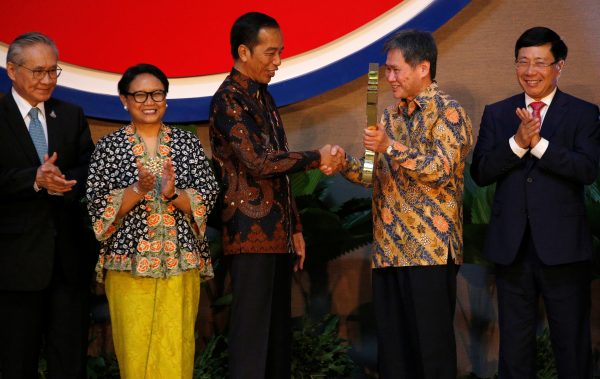ASEAN hopes that a distinct vision will reconcile the competing visions of a regional order advocated by major powers. Adopting the Outlook will remind ASEAN and extra-regional powers of a simple message: ASEAN centrality should never be forgotten. Indeed, one of ASEAN’s remarkable qualities since its inception in 1967 has been its ability to survive the power plays among great powers.
During the Cold War, ASEAN (only five members at the time) believed that it could preserve regional peace and stability by trying to keep great power rivalries out of the region. The Zone of Peace, Freedom and Neutrality (ZOPFAN) is an example of this approach.
When the Cold War ended, a new strategic context compelled ASEAN to embrace extra-regional powers as a strategy for maintaining peace and stability in the region. This is demonstrated by the proliferation of ASEAN-centred multilateral processes and platforms such as the ASEAN Regional Forum, the ASEAN+3, the ASEAN Defense Ministers Meeting-Plus and the East Asia Summit.
This short-lived unipolar moment allowed ASEAN to focus on deeper institutionalisation and the regional community-building project. ASEAN adopted the ASEAN Charter and agreed on a blueprint to transform itself into an ASEAN Community.
Today, ASEAN finds itself in new terrain. The world is undergoing profound change. Scholars and policymakers speak of a world in disarray, disorder and even anarchy. Norms no longer define how states behave towards each other.
Faced with such strategic uncertainty, every nation is scrambling to situate itself in the emerging strategic environment, individually or collectively. Some Indonesians have begun to worry about peace and stability in Southeast Asia, the future of ASEAN, the future of East Asia and more importantly about Indonesia’s place in the emerging regional order.
The geoeconomic and geopolitical centre of gravity is shifting East. China is fast becoming a great power, if it is not already. The United States is trying to sustain its primacy in the world while dismantling the international order it has helped build since 1945. Yet the process of that strategic change is still unfolding, and its final outcome remains to be seen.
Three developments have emerged from that process of change. First, a great-power game is returning to Southeast Asia. Second, the future of Southeast Asia is increasingly defined by how extra-regional powers interact with each other. And third, key extra-regional powers are beginning to promote their own visions of regional order.
This raises two questions. Are we about to see the end of the ASEAN-centred regional order? And if so, what are we going to do about it?
The AOIP is an attempt to answer these questions. The AOIP recognises ‘it is in the interest of ASEAN to lead the shaping of their economic and security architecture’ in order to address emerging challenges in the Asia Pacific and Indian Ocean regions.
The Outlook promises that ASEAN will ‘continue to maintain its central role in the evolving regional architecture in Southeast Asia and its surrounding regions’ and continue to be ‘an honest broker within the strategic environment of competing interests’.
Indonesia needs to ensure that the AOIP is not another exercise in norm-setting. President Jokowi is now trying to balance past preference for norm-setting and norm-building with more action-oriented, realistic and interest-driven foreign policy initiatives. This points to two imperatives for Indonesia.
First, it is imperative for Indonesia to continue implementing its maritime strategy comprehensively. Second, it is also imperative for Indonesia to continue driving the discussion within ASEAN on a common strategy for navigating the Indo-Pacific.
The AOIP is a response to the growing external pressures that threaten ASEAN’s unity, undermine ASEAN’s relevance and corrode ASEAN’s centrality. Responding to external change at critical times is something ASEAN has always been good at.
Seen in this light, the AOIP is a strategic necessity. ASEAN can no longer sit and watch extra-regional powers actively shape the future of the region. ASEAN must ensure that its two core interests — ASEAN centrality and strategic autonomy of the region — will be preserved, enhanced and reinforced. ASEAN hopes that the AOIP will provide the necessary platform to do that.
The AOIP would not have been possible without Indonesia’s initiative and determination. Under the leadership and direct involvement of Foreign Minister Retno Marsudi, Indonesia convinced its regional partners that it is a strategic necessity for ASEAN to articulate its own vision of the future regional order and its architecture.
Our key strategic interest in the region is to maintain ASEAN’s strategic autonomy. Indonesia hopes that the AOIP will address regional strategic challenges, give impetus for greater regional cooperation and serve as a platform through which great-power rivalries can be mitigated.
Indonesia also expects the AOIP to serve as an inclusive meeting place for the competing visions of regional order offered by great and regional players. And most importantly, it expects to maintain ASEAN’s relevance, uphold ASEAN’s centrality, preserve ASEAN’s unity and sustain Southeast Asia’s strategic autonomy.
H.E. Rizal Sukma is Indonesian Ambassador to the United Kingdom, Ireland and the International Maritime Organization (IMO). This article is based on his presentation at the Centre for Strategic and International Studies (CSIS) Indonesia Lecture Series on Regional Dynamics, Jakarta, 28 August 2019.
This article appears in the most recent edition of East Asia Forum Quarterly, ‘Economics and security’, Vol. 11 No. 4.

